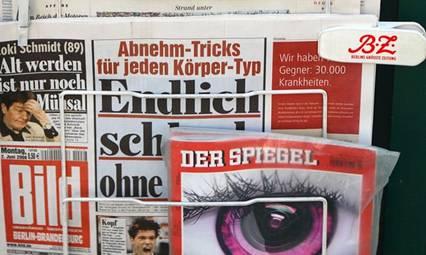Der Spiegel removes 'antisemitic' book from bestseller list
WHEN THEY START CHANGING THE BEST-SELLER LISTS, things have gotten pretty bad. I took this article from The Guardian: https://www.theguardian.com/world/2017/jul/28/der-spiegel-finis-germania-rolf-peter-sieferle-bestseller-list (My underlining)

‘We felt a responsibility’ … copies of Der Spiegel on sale with other German newspapers. Photograph: Steven May/Alamy
Philip Oltermann and Alison Flood
Friday 28 July 2017
The influential [very far left, anti-Nationalist, pro-Internationalist -cy] German news magazine Der Spiegel has deleted from its bestseller list a book that one of its own editors had pushed up the rankings, after it was found to be “antisemitic and historically revisionist”.
Finis Germania, or The End of Germany, collects the thoughts of the late historian Rolf Peter Sieferle on the position of Germany, including how it deals with the Holocaust. The book is currently at the top of Amazon.de’s bestseller chart and this month it entered Der Spiegel’s bestseller list, which many bookshops use as a basis for promotional displays, in sixth place.
Finis Germania is missing from the list in this week’s issue of the magazine. Many bookshops have followed suit and are not displaying the title.
Susanne Beyer, Der Spiegel’s deputy editor, said Finis Germania had been omitted because the magazine considered the book – posthumously published by a small house, Antaios, known for its far-right leanings – to be “rightwing extremist, antisemitic and historically revisionist”.
Since Der Spiegel understood itself as “a medium of enlightenment even on historical subjects”, Beyer continued, the magazine had decided not to help advance the sales of such a book.
 Beyer admitted that, in June, Finis Germania had made it on to a prestigious list of nonfiction books of the month, after her colleague Johannes Saltzwedel recommended the title. [Left: the book as it appeared on the publisher's web site - https://antaios.de]
Beyer admitted that, in June, Finis Germania had made it on to a prestigious list of nonfiction books of the month, after her colleague Johannes Saltzwedel recommended the title. [Left: the book as it appeared on the publisher's web site - https://antaios.de]
Saltzwedel, one of the jury members for the non-sales-based recommendations list published by the broadcaster NDR and the Süddeutsche Zeitung newspaper, had used all of his available 20 votes to nominate Sieferle’s collection of short essays. Usually, jury members divide their votes among several books.
Saltzwedel, who has since resigned from the jury, said he had “consciously tried to bring a very provocative book of historical and contemporary interpretation into the debate”.
Jo Glanville, director of the freedom of speech group English PEN, criticised Der Spiegel’s decision. “This is an embarrassing move for Der Spiegel. The publication of the ranking of bestselling titles is surely a statement of fact,” she said. “This omission risks undermining the magazine’s authority and reputation. Censorship can never be a successful tool for tackling the far right.”
Der Spiegel’s editor, Klaus Brinkbäumer, said: “Our decision was welcomed by a lot of readers and criticised by some (and criticised by a few other media and digital newsletters).
“I understand the criticism because a bestseller list’s goal has to be to be objective and data-based, of course. In this very singular case, and with the case’s history, the Spiegel ranking would have been regarded as a second recommendation. It is an antisemitic book, so we felt a responsibility.”
Critics have likened Finis Germania to the writings of deeply reactionary German “cultural declinists” of the early 20th century, such as Oswald Spengler or Ernst Jünger.
The political scientist Herfried Münkler said the book was “deeply impregnated with antisemitic ideas”, while Die Zeit called it “singularly obnoxious”.
Others, including the philosopher Rüdiger Safranski, have defended Sieferle’s book as a work in the “night thoughts” genre pursued by poets such as Edward Young or Heinrich Heine, describing it as “very pessimistic, very melancholy, but also brilliantly phrased”.
Sieferle, who published historical works with many of Germany’s most respected publishing houses and advised the government on environmental policy, took his own life in September 2016. Finis Germania paints a doom-laden picture of his homeland’s future.
The author brackets Germany in a group of “tragic peoples” that also includes “the Russians” and “the Jews” – ethnic groups that, as he writes, “are more sharply marked by the paradoxes of historical processes” than the “Anglo-Saxons”, who are resistant to history “like a well-greased boot to water”.
In the first half of the 104-page booklet, Sieferle rejects the Sonderweg theory of German history – which argues that Germany found a path from aristocracy to democracy [un]like any other in world history – as “entente propaganda”.
In the second half, Finis Germania takes a more cynical turn. Sieferle in effect accuses the Jewish people of offloading their own historical guilt on to the German people after the Holocaust. He writes: “The Jews’ guilt for the crucifixion of the messiah was never recognised by them. The Germans, who recognise their merciless guilt, have to disappear from the surface of real history.”
Sieferle goes on to describe Auschwitz as “the last myth in a thoroughly rationalised world”. This is a highly controversial passage in a country in which Holocaust denial remains punishable by law, even if the book then goes on to define a myth as “a truth beyond discussion” rather than an untruth.
The historian Gustav Seibt, a book critic for Süddeutsche Zeitung, told German radio: “I can find little else [in the book] other than the age-old antisemitic topos of Jewish vengefulness and mercilessness. And that’s not a new idea – it is not a meaningful provocation, but a denigration in a very old and sinister manner.”
On its website, Antaios said the scandal surrounding the book “has shown that none of the claqueurs has ever read the book at all”.
Category
Germany, Immigration, Jews- 327 reads










Comments
Spiegel and Sieferle
Once (some decades ago) "Der Spiegel" had been a counter-public magazine of investigative journalism. Nowadays it has degenerated as a mainstream paper supporting the official ideology. Symptomatic during the US election compaign was an edition headline "Who will save us from Donald Trump?".
Prof. Sieferle in one of his latest papers had called Hitler disparagingly as the greatest failures (or losers) of the century, but otherwise he has labeled Angela Merkel pointedly as one of the most catastrophic figures in history.